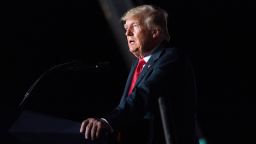Editor’s Note: On Sunday at 9 p.m. ET, CNN will air Fareed Zakaria’s latest special report, “The Fight to Save American Democracy,” which examines the threat to American elections after January 6, 2021, and the possibility of another crisis in 2024. This piece draws on similar themes as the author’s essay in the current issue of Foreign Policy. View more opinion at CNN.
On the anniversary of January 6, as we think about the future of American democracy, it’s useful to look around the world at what scholars have called a “democratic recession.” From Hungary to Poland to Turkey to India, democratic norms, values and institutions are under stress.

And it’s not just happening in fledgling democracies. Consider, for example, modern Germany. After its hellish descent into tyranny in the 1930s and 1940s, Germany came out of war defeated and destroyed but then re-emerged and recreated itself. Today it appears to be an almost preternaturally stable democracy. Angela Merkel served solidly for 16 years as Chancellor, and she has been succeeded by her former finance minister, another moderate. The country’s policies seem to have shifted in only marginal ways. The populist right is marginal and ineffective.
But behind that calm lie more turbulent currents. As the scholar Richard Pildes notes, for decades, Germany’s two main political parties taken together usually got around 90% of the vote. But they got just under 50% in the 2021 federal election.New parties and new movements are emerging.
Pildes calls this “political fragmentation,” and it’s happening across the Western world. France’s socialist party – one of Europe’s most successful – is now a shadow of its former self. Spain has had to hold four elections in four years to arrive at a workable coalition. Ever since 2018 ushered in the right-wing populists, Italian politics has been in turmoil, saved now by a technocratic government headed by Prime Minister Mario Draghi. Even the Netherlands took a record 225 days to form a coalition government in 2017.
Why is this happening? Some of the reasons are familiar. An age of rapid technological change, accelerating globalization and increasing ethnic diversity have created great anxieties. These anxieties then lead to distrust in traditional institutions and established parties. New figures crash onto the political scene, some of whom peddle fear and offer simple solutions to get rid of all this new complexity and take the country back, back to when times were more stable, back to when the country was great (in the misty, often mistaken memory).
But why does American democracy feel more threatened than, say, French or Spanish democracy?
In those countries, the new radical forces do not seem as determined to attack the core of the political system. First, it is worth noting that in Europe, the order being attacked is the European Union, which is in fact under considerable strain. One of its three largest economies, Great Britain, has exited the union. Others, like Poland and Hungary, are seeking to weaken it from within.
But all that said, America does feel especially under stress as it approaches its next presidential election. If the scenarios outlined in my special report, “The Fight to Save American Democracy,” come true – Trump runs, wins the nomination, and it’s a close election – we will almost certainly face a constitutional crisis. More worrying, given the changes to election procedures, we will likely face this kind of contestation after every close election in America moving forward. The basic legitimacy of the American electoral system has been eroded. Republicans in particular have embraced a big lie: that American elections are filled with fraud.
It may be that we have exposed a flaw in the founders’ Constitution. They believed that to create a political system, you did not need to ensure that people acted virtuously. “If men were angels,” James Madison famously wrote, “no government would be necessary.” Ambition would be made to counteract ambition – and this system of checks and balances would preserve liberty and democracy.
But can a system work without human beings acting responsibly, even virtuously? One branch of government, Congress, is supposed to check the other. But today, for Republicans party politics trumps institutional loyalty. The real scandal of January 6 is not what happened outside the Capitol alone, it’s what happened inside when a majority of House Republicans voted to overturn the valid results of a presidential election simply to curry favor with then-President Donald Trump. It is that vote, not the violence, that almost broke the American system.
We often hear that, unlike in fledgling democracies, America’s institutions are strong. But, as Ralph Waldo Emerson said, “An institution is the lengthened shadow of one man.” If people abuse them, attack them, disregard them, they will slowly collapse.
And so all our efforts must be devoted to making people act virtuously. In particular, Republicans must come to realize that they can and should disagree with Democrats vigorously on taxes, regulation, inflation, the environment – whatever they want. But now they must come together with those same Democrats to preserve a credible and legitimate political system.
For all of us, that is the most important political issue right now, not your views on Iran or green subsidies. Those differences can wait. Let’s first save American democracy.


